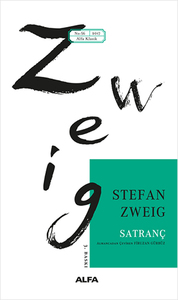Take a photo of a barcode or cover
challenging
dark
emotional
inspiring
mysterious
reflective
sad
medium-paced
Plot or Character Driven:
Character
Strong character development:
Complicated
Loveable characters:
Yes
Diverse cast of characters:
Yes
Flaws of characters a main focus:
Complicated
As a lover of stories where the main setting is a boat, I knew I would love Stefan Zweig’s Chess Story (also known as ‘The Royal Game’) as soon as I read ‘takes place on a steamship…’ This is partially a joke, but like my beloved Moby Dick, boats and ships offer a conveniently constrained narrative space in which its passengers are ‘locked together’, and the diversity of these passengers becomes an emblematic microcosm of society, ripe for analogy-heavy storytelling. Chess Story gives us the same kind of unlikely band of characters who are brought together in a steamship bound from New York to Argentina. These characters being: the narrator, an unnamed, hardly mentioned Austrian; Czentovic, the current world chess champion; McConnor, a Scottish oil tycoon who made a fortune in California, and a mysterious stranger who seems to meet the match of the best in the world.
It is hard to discuss this very short novella without ‘spoiling’ anything, but the main thrust of the work is this narrative frame that highlights the story of the mysterious stranger, Dr B, who interrupts a ‘simultaneous’ chess game where the gentry of the steamship all play together against Czentovic under McConnor’s patronage. Dr B changes the group’s losing move, recounting a famous chess game played in the past, and takes over the game, seemingly able to calculate dozens of moves in advance. When asked to play again, he says he can’t, having not played a real game of chess in decades. Curious, our narrator introduces himself to Dr B, who tells the narrator and the reader his story of how he became so knowledgeable at chess without ever playing it.
The majority of the novella is dedicated to Dr B’s story, who reveals he was held captive by Nazi forces in Austria and subjected to isolation torture for months. During this period, he stole a chess book from a guard uniform and taught himself how to solve chess positions in an obsessive, psychotic, synesthetic craze. Zweig beautifully describes the psychological impact of this torture, rending physical the immense amounts of mental strain from a complete lack of reference to time and location, and the horror of constantly looping thoughts and delirium. It is a terrifying, gripping read, and even if the whole plot was laid bare just here I would still say it's worth reading for the prose in relation to this.
Zweig died of suicide in Brazil one year after publishing Chess Story. As part of writing this review, I read his short suicide note where he stated that his ‘own power has been expended after years of wandering homeless’—homeless, as in, having left Austria behind due to the ongoing Nazi occupation. I do not think it’s appropriate to analyse a suicide note heavily. But the virtues extolled of chess in this novel—could these not be the same virtues of writing? To the extent that both are perfect ‘side pursuit’ of intellectual activity, both beautiful ‘games’ capable of mastery and imaginative analysis? The infinitely imaginative Dr B wins in a chess match against the mechanical Czentovic in the end, but, in the rematch, the immense amounts of mental calculation (alongside with the tactical sadism of Czentovic) requires him to resign, and to leave, quitting chess forever. It was hard not for me to read the resignation as an existential one, even if that resignation protects oneself from the horrific mental strain the exercise of chess/writing entails.
This is the first Zweig I’ve read and I can understand why he’s so highly regarded. The story is told in first person past tense where the narrator is a mere bystander to the events going on in the novel between the main characters. Zweig’s style is structured and fluid, extremely easy to read, and largely dialogue-driven and external, at least until we get to Dr B’s frame story, in which Zweig grants a conversational psychological lucidity in the same vein as a Dostoevsky story. I found it a breeze to read, especially coming off some more experimental work, and the chapterless, scene-breakless structure means anyone who picks this up will likely finish it in one sitting.
His efficient, economical and impactful language has left a great impression on me, and I would definitely read more of his work, of which I've heard feature similar stories of psychological obsession.
challenging
dark
emotional
informative
fast-paced
Plot or Character Driven:
Character
Strong character development:
Yes
Loveable characters:
Yes
Diverse cast of characters:
No
Flaws of characters a main focus:
Yes
Graphic: Suicidal thoughts
Moderate: Violence
Ein gutes Buch, vor allem die "zweite Ebene" mit Czentovic als Symbol für den gefühlslosen grausamen Nationalsozialismus und Dr. B, der die Opfer der NS-Zeit darstellen soll, mochte ich.
Wahrscheinlich ist Czentovic auch deswegen so oft als "dumm" (und wesentlich abwertendere Begriffe) beschrieben worden, aber das hat mir nicht so gut gefallen, weil es sich häufig auf sein Inseltalent als Schachspieler bzw. Seine Herkunft als ärmlicher Bauerssohn bezogen hat.
Wahrscheinlich ist Czentovic auch deswegen so oft als "dumm" (und wesentlich abwertendere Begriffe) beschrieben worden, aber das hat mir nicht so gut gefallen, weil es sich häufig auf sein Inseltalent als Schachspieler bzw. Seine Herkunft als ärmlicher Bauerssohn bezogen hat.
emotional
mysterious
reflective
tense
fast-paced
Plot or Character Driven:
Character
Strong character development:
No
Loveable characters:
N/A
Diverse cast of characters:
No
Flaws of characters a main focus:
Yes
reflective
fast-paced
Plot or Character Driven:
Character
Strong character development:
N/A
Loveable characters:
Yes
mysterious
fast-paced
dark
tense
medium-paced
Plot or Character Driven:
A mix
Strong character development:
Complicated
Loveable characters:
Yes
Diverse cast of characters:
Complicated
Flaws of characters a main focus:
Yes
Een briljant idee: de psyche van de vereenzaamde mens ontrafelen als in een schaakspel. En dat in volle Nazitijdperk, waar elke psychologische grens sowieso genadeloos wordt overschreden. Schaaknovelle neemt je van bij de eerste letter mee in een vloeiend geschreven, ongelooflijk straffe spanningsboog. Meer zelfs, auteur Stefan Zweig speelt het schaakspel als het ware met de lezer zelf door die meesterlijk mee te voeren in een doldraaiende dynamiek van de menselijke geest. Waanzinnig reëel en overtuigend.
challenging
dark
mysterious
reflective
tense
fast-paced
Plot or Character Driven:
Character
Flaws of characters a main focus:
Yes






